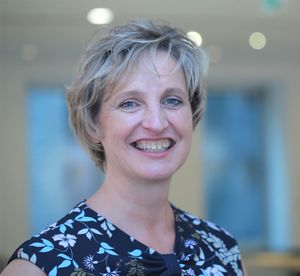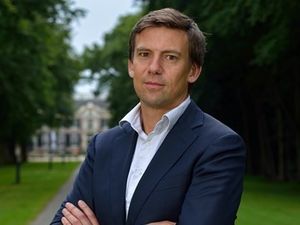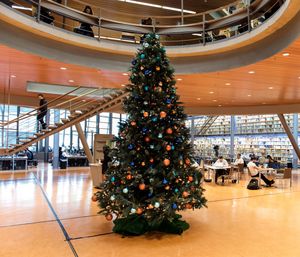TU Delft honour master students reflections on learning about resilience
Resilience helps people thrive in whatever they do: be it a career in sport, business or life in general. In October 2020, students from the Masters Honours Track, “Business Leadership For Engineers” (BLE), attended a lecture entitled “Leading with Resilience”. Gerritjan Eggenkamp, Olympic rowing medallist, Partner at Avedon and a TU Delft alum, and Margaret Welten, Career Counsellor at TU Delft hosted the session. The aim of BLE was to take lessons from someone who has explored the topic of resilience in the most extreme fashion, namely as an Olympic athlete, and explore how resilience has contributed to his personal and professional success.
Discussions centred around a framework consisting of six domains of resilience: vision, composure, reasoning, health, tenacity and collaboration. Students were asked to rate themselves against each of the domains to assess their resilience and state one domain that they commit to focus on to build resilience. One third decided to focus on health, another third chose composure and the remaining students chose between vision and collaboration.
Recognising that we all have mental health, just as we all have physical health was the key message to students. Positive mental health allows individuals to develop, learn, and cope with the stresses of life. You can't be resilient if you’re not well. Well-being is the foundation of resilience. Yet prior to the lecture, resilience was a topic students hadn’t given much consideration to. They had a limited concept of the term. One student reflected:
“Resilience is a part of our everyday lives but is often overlooked and taken for granted”.
Another wrote:
“I had always considered myself quite resilient, but I learned that it is multi-faceted and deserves more attention”.
A particularly inspiring comment by one of the students was:
“Just like presidents or world leaders are often remembered for their response to a major crisis, the defining moments of your life are often moments of difficulty. Being able to respond effectively to these moments and not let them get the best of you is what resilience is all about”.
The opportunity to contrast the theory and reflect on their personal life experiences, opened up the students appreciation of resilience. For some, contextualising their life experiences within the six domains of resilience highlighted how resilient they actually were. For others, there was power in sharing stories of adversity such as navigating the transition of living in a new country, bereavement and managing health issues. It was humbling and inspiring to hear the stories, as well as healing for those who were heard. Resilience is more than picking yourself up and brushing yourself down. Resilience is like a muscle which can be developed. Using a framework enables students to assess and build their self-awareness and structure their personal development. One grateful student reflected:
“thanks to the lecture, I am now able to translate the abstract concept of resilience to six practical domains, encouraging very specific actions for improvement, ranging from a healthier lifestyle to a clear future vision”.
No matter how old you are, you can always improve in being resilient. It’s a life-skill and learning it early will help set you up for success.
Here is a brief overview of the six domains and reflections from the students.
What makes this lecture particularly pertinent is TU Delfts current strategic commitment to student and employee well-being. During their annual Education Day, held on the 5 November 2020, the theme was “Expanding Our Educational Horizons – Navigating In The Fog”. Discussion topics included the well-being aspects of students and employees and how students can be better supported. Educating students at the beginning of their career journey supports their social and emotional wellbeing. What was clear from this lecture was that the students valued learning about the subject of resilience and hearing experiences from a professional role model. There is an opportunity to normalise experiences which helps students build their resilience and become more successful. It falls to teachers to find ways of integrating soft skills into their current instruction and routine classroom activities. IN addition to the BLE program, the universities Study Climate Program is catalysing the development of dedicated courses on this type of personal skills and the incorporation of modules in the conventional curriculum.
Life is a marathon, not a sprint - building resilience is key to supporting the professional well-being of our future engineers.
About the cohosts:
Margaret Welten is a Career Counsellor at TU Delft and a member of the Business Leadership for Engineers teaching team. As an experienced Human Resources professional with a MSc in Career Coaching, she delivers personalized coaching and workshops to students, PhDs and academics. At junctures in their life's, she helps individuals take stock of their strengths, values and interests and define what’s needed in terms of achieving further career success.

Gerritjan joined Avedon in 2012. Prior to Avedon, he worked 8 years at McKinsey&Company, focusing on strategic and corporate finance related projects in the logistics, transport and infrastructure sectors. Before that, Gerritjan worked 2 years at ING as an account manager commercial loans for SMEs and was a member of the Dutch rowing team competing in several World Championships and Olympic Games. He holds a MSc in Applied Computer Science from Delft University and a MSc in Management Research from Oxford University.

More information
Would you like to learn more about this topic, please contact Margaret Welten.